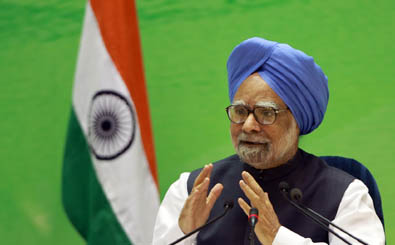World Business
India may lift curbs on foreign buying of equities
By Unni Krishnan and Anto Antony (China Daily)
Updated: 2010-10-09 14:43
 |
Large Medium Small |
|
 |
|
Manmohan Singh, India's prime minister, speaks during a news conference in New Delhi. Singh is allowing greater foreign participation in financial markets as he seeks capital for building roads and power plants. Pankaj Nangia / Bloomberg |
NEW DELHI - India may allow individual investors based overseas to directly buy stocks for the first time, easing a rule that restricts investment to mutual funds, a finance ministry official with direct knowledge of the matter said.
Some government officials see no need to differentiate between India-focused mutual funds and foreign retail investors, the official said, declining to be identified because the review of the rule is confidential. The finance ministry may set a limit on the amount individuals can invest, the official said.
The rule change may add to the $92 billion foreign funds which have poured into local stocks since they were allowed into the country in 1993, with almost a quarter invested this year.
"It indicates continued liberalization of the stock market and represents another step in internationalizing of India's financial markets," said Dariusz Kowalczyk, Hong Kong-based chief economist for Credit Agricole CIB. "It's favorable for local equities and the move would broaden the pool of funds they can access to expand business".
Greater access
Prime Minister Manmohan Singh is allowing greater foreign participation in financial markets as he seeks capital for building roads and power plants in a nation ranked below Cote d'Ivoire and Sri Lanka for the quality of infrastructure by the World Economic Forum's Global Competitiveness Index.
Last month, he increased the overseas investment cap for government and corporate bonds by $5 billion each to a total of $30 billion.
Policy makers in Asia's third-biggest economy have been traditionally wary of a surge in capital inflows because possible panic withdrawals by foreigners have the potential to cause financial instability, said D.H. Pai Panandiker, president of RPG Foundation, an economic research group in New Delhi.
"The move shows the fear is ebbing," Panandiker said. "There's confidence there won't be much of outflows even in worst of times."
Purchases of Indian shares by funds based overseas reached a record $22 billion this year as the economy weathered a global recession triggered by the 2008 credit crisis.
 HK prepares for global yuan
HK prepares for global yuan


